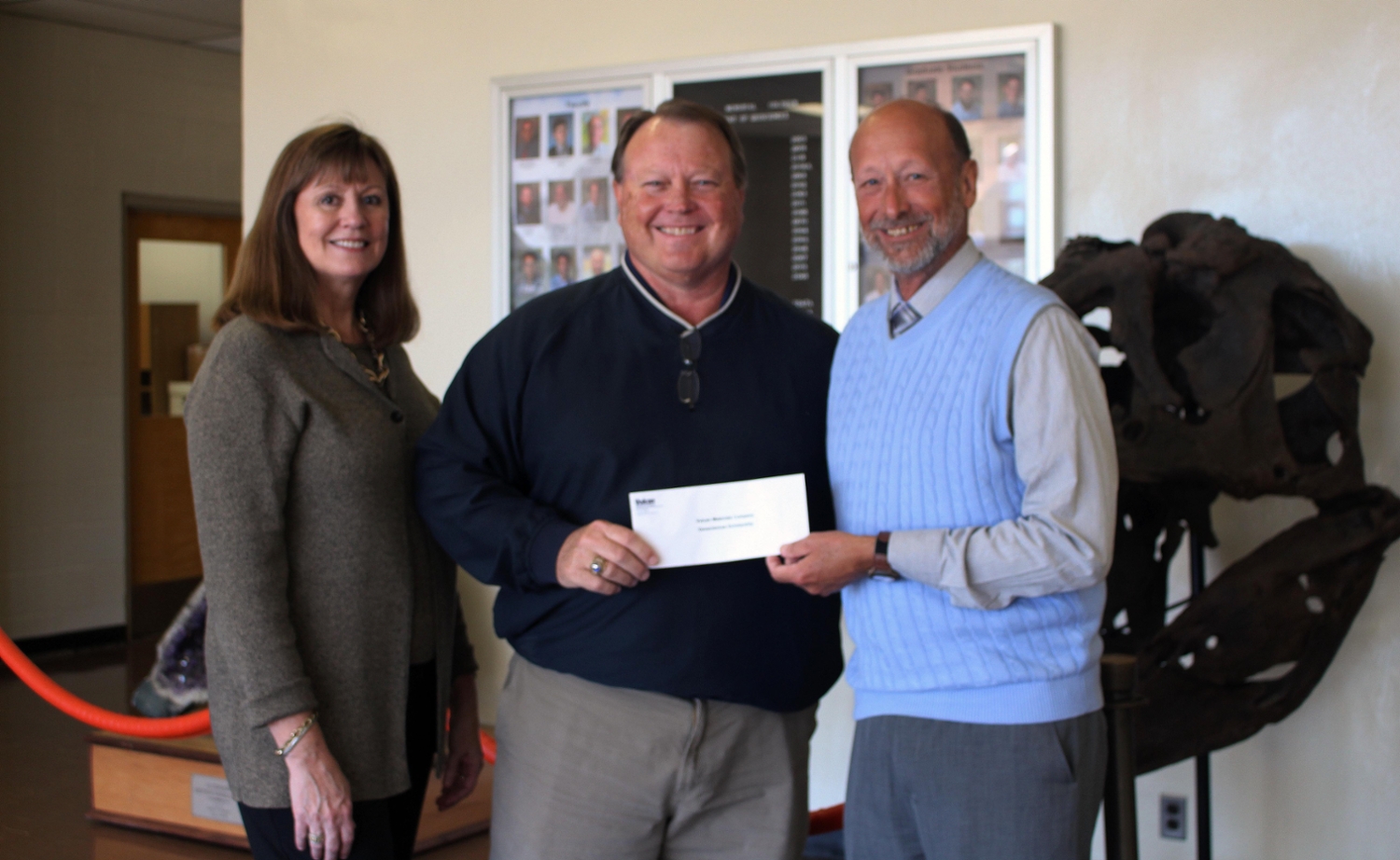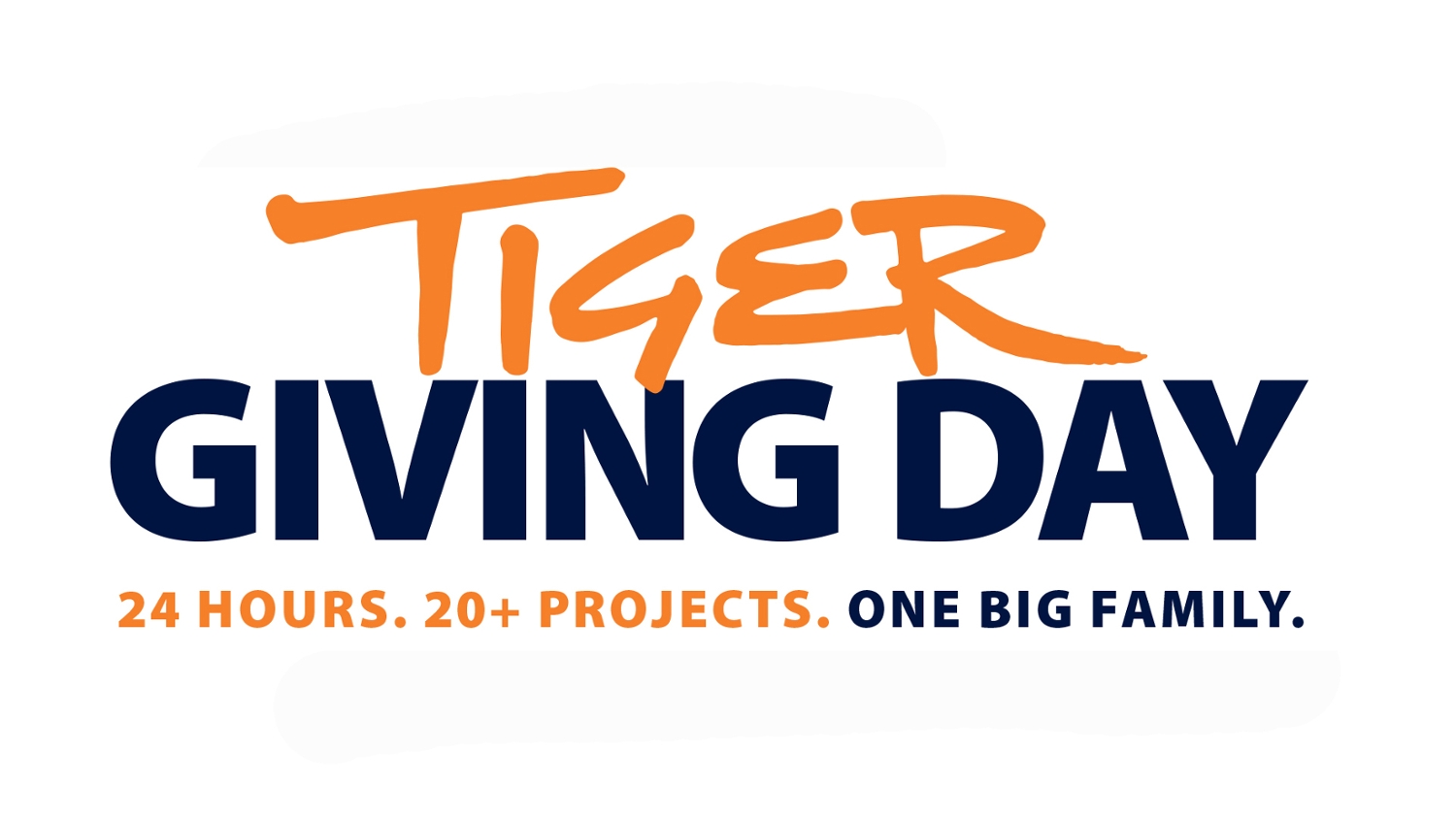
|
|
Save the Date for Tiger Giving Day
Join the College of Sciences and Mathematics' alumni and friends on Feb. 21 for Tiger Giving Day, a 24-hour fundraising event that will highlight more than 20 projects from Auburn University schools, colleges and various campus units.
This year, COSAM seeks to fund two projects, a display for the Auburn University Museum of Natural History’s dinosaur egg, and scholarships for pre-health students to study abroad in London.
The museum is home to the only dinosaur egg ever found east of the Mississippi River. The egg, a duck-billed dinosaur, is currently housed in a Styrofoam box marked “dinosaur egg.” This extraordinary piece of biological, ecological and historical importance is in need of a proper display complete with glass enclosure, pedestal and security. The display will also be equipped with an interactive video component featuring CT scans and 3D images of the egg, information about Alabama dinosaurs, and an option to virtually dissect and reconstruct the egg.
COSAM alumni are some of the best, brightest and most-prepared graduates entering professional programs around the country. In an effort to further enhance COSAM’s already stellar pre-professional programs, COSAM is offering students an opportunity to participate in a Pre-Med Study Abroad Program in London, England. The trip, scheduled for May 8-21, 2017, will allow students to gain a global perspective on healthcare by shadowing physicians and touring the medical schools at King’s College London, University of Sheffield and St. George’s Hospital.
We ask for your help to secure a permanent home for our one-of-a-kind dinosaur egg and to allow our students the invaluable opportunity to study in London. Your generous support will continue to propel our college forward while creating new opportunities for our current and future students.
If you would like to participate in Tiger Giving Day prior to Feb. 21, contact Brook Moates at 334-844-2931 or brook@auburn.edu.
For more information and updates on Tiger Giving Day, follow our Facebook, Twitter and Instagram.
|
|
Alumni Spotlight: Tina H. Straley, mathematics ’71, reflects on her time as a graduate student, her successful career in mathematics, and her enduring love for Auburn
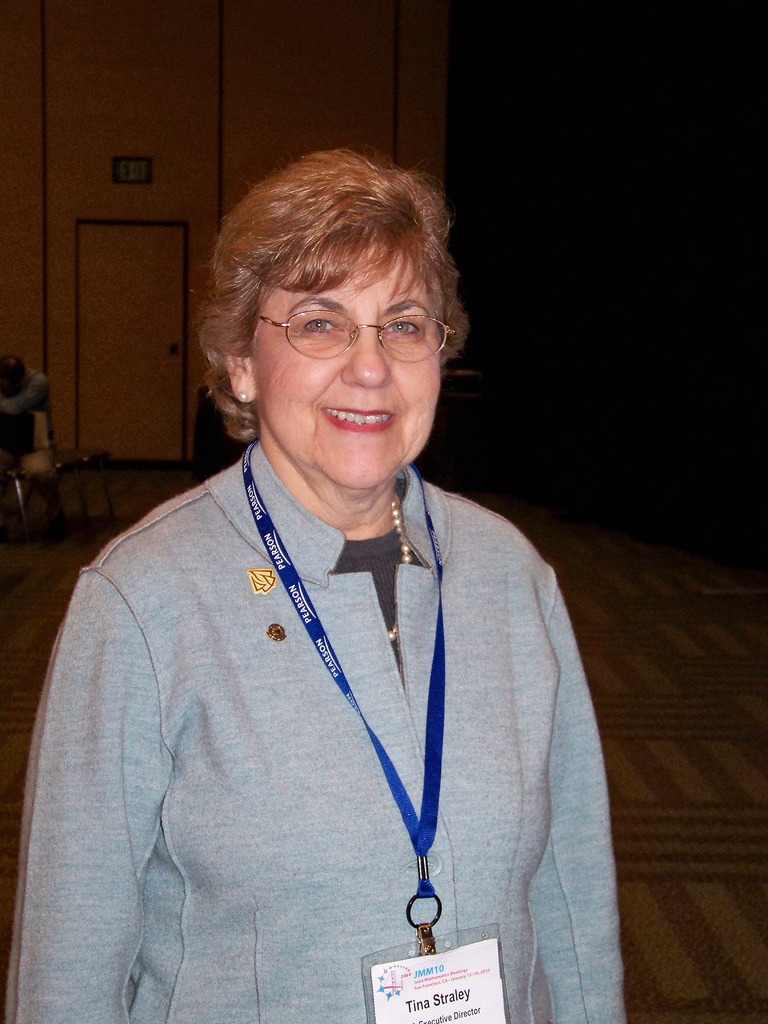
I chose to attend Auburn for graduate school because of the strong reputation of the mathematics faculty, and because the Graduate School chose me to receive a National Science Foundation Traineeship that covered all academic costs and a stipend for living expenses. Auburn was highly recommended by a professor at Georgia State University where I received both a bachelor’s and master’s degree in mathematics. The NSF award allowed me to concentrate totally on my studies with no other work responsibilities. All of these factors made Auburn my decided choice.
I was not entirely sure what field in mathematics to pursue, but when Professor Charles ‘Curt’ Lindner joined the mathematics faculty the second year I was there, I was enthralled by him as a teacher and by his fields of specialization, combinatorics and universal algebra. In a seminar he conducted, we started working on current research papers from the beginning of the term. I was soon able to greatly extend a very recent result and amazingly, I wrote a dissertation and graduated with a doctorate degree after my third year in graduate school.
From Auburn I joined the faculty of Kennesaw Junior College in Georgia, which had opened less than 10 years before as a two-year college, for a one-year appointment. By the time I arrived, the college was planning for its baccalaureate status. My temporary position became a tenure track position the next year, and I was part of a small cadre of faculty in mathematics who were given the opportunity to build a department, design a major, and create the entire offerings of a mathematics department in a four-year college. Kennesaw grew rapidly, and I grew professionally along with it. I was on the faculty for a span of 27 years, during which time Kennesaw went from a two-year college of 2,000 students, to Kennesaw State College to Kennesaw State University with 15,000 students (now over 30,000). Along the way, I progressed through the academic ranks to professor, served as department chair, and then as associate vice president for scholarship and dean of graduate studies. Also during that span of time, I spent a year as visiting research associate at Emory University, and two years as a program officer in undergraduate education at the National Science Foundation.
Click here to continue reading...
|
|
David Steen receives Mindlin Science Communication Prize
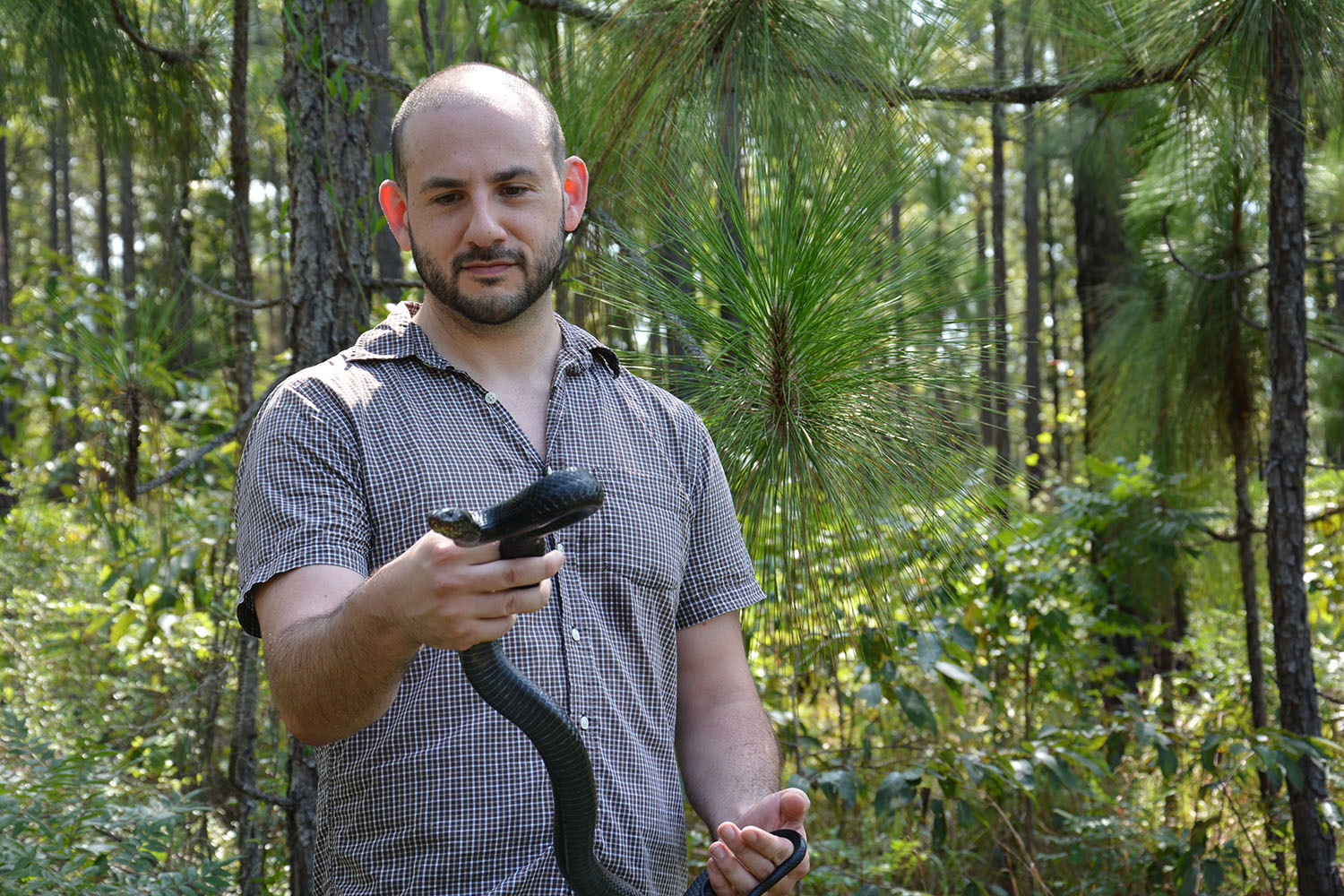
David Steen, assistant research professor at the Auburn University Museum of Natural History, received the Mindlin Science Communication Prize for his efforts to communicate with the lay public via the internet. Steen maintains a strong online connection with the public through his wildly popular blog, www.livingalongsidewildlife.com, as well as his Twitter account, @Alongsidewild.
Steen is a herpetologist whose research has taken him to the Florida Everglades to hunt pythons, snorkeling through streams in southern Georgia looking for Alligator Snapping Turtles, hiking through Conecuh National Forest in south Alabama to release Eastern Indigo Snakes into the wild, and exploring natural habitats throughout the east coast of the U.S., including Puerto Rico. He has also worked in Azerbaijan, Costa Rica, Nicaragua and Brazil. Throughout each effort, Steen uses the internet as a means of communicating with the public the importance of respecting and appreciating the wildlife around us.
Steen also encourages active participation from the public. He has established himself as the go-to online snake identification expert, receiving countless snake photos and identification requests each day from people all over the U.S. and world. For more information on David Steen, visit his website.
|
|
Auburn University physics professor serves as co-organizer of National Science Foundation workshop
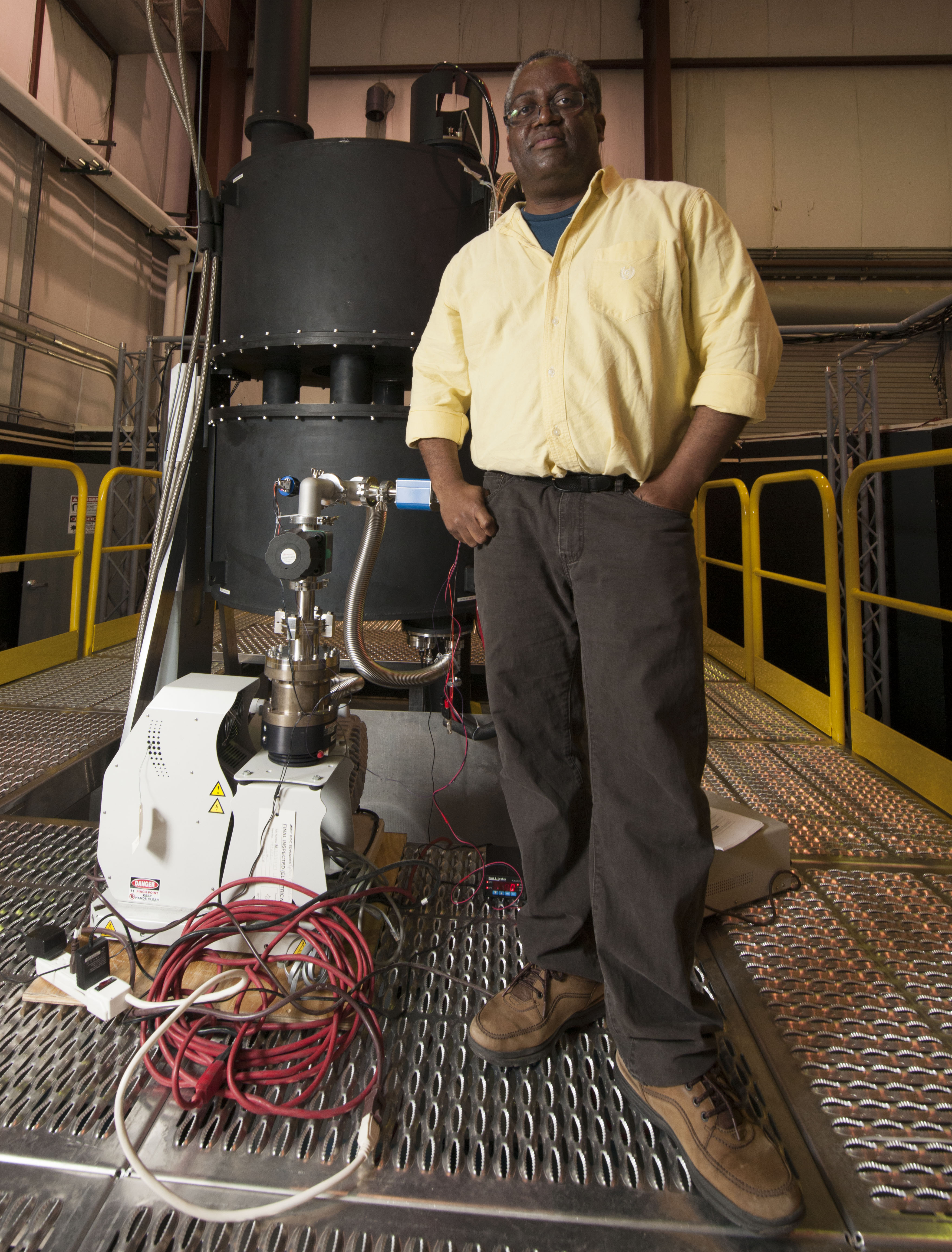
In commemoration of the 20th anniversary of the National Science Foundation/Department of Energy Partnership in Basic Plasma Science and Engineering, from January 9-11, a workshop was held at NSF Headquarters in Arlington, Virginia. Auburn University Physics Professor Edward Thomas served as one of the three lead organizers of the workshop, which was sponsored by the National Science Foundation and the U.S. Department of Energy. Approximately 100 plasma scientists and engineers were invited to give oral and poster presentations on the diversity of research topics supported by the partnership. The goal of the three-day meeting was to celebrate 20 years of partnership and achievements, and to assess progress and challenges in the broad field of plasma science and engineering as encompassed by the scope of the NSF/DOE Partnership. Assisting Professor Thomas as lead organizers were Professor Ellen Zweibel from the University of Wisconsin, Madison, and Professor Jorge Rocca from Colorado State University.
Professor Thomas’ research activities in dusty/complex plasmas have been continuously supported by the NSF/DOE Partnership since its inception in 1997. Thomas is the Lawrence C. Wit professor in the College of Sciences and Mathematics and the Charles W. Barkley Endowed Professor. He is the director of the Plasma Sciences Laboratory, associate editor of the Journal of Plasma Physics, member of the American Physical Society-Division of Plasma Physics Executive Committee, chair of the Advisory Committee for the Caribbean Green Technology Center at the University of the Virgin Islands, and a consultant for the non-profit organization-Quality Education for Minorities (QEM Network).
His current research in dusty/complex plasmas consists of transport and thermodynamics of dusty plasmas, the development and operation of a multi-user facility for magnetized dusty plasmas, and diagnostic development, waves and transport in microgravity complex plasmas. While working with dusty/complex plasmas, his research also involves plasma flows in magnetized plasmas, which include multi-scale studies of electrostatic instabilities in plasmas with sheared flows and properties of lower hybrid and electromagnetic ion cyclotron waves in laboratory and space plasmas. As of fall 2016, Professor Thomas has generated more than $7.15 million in external funding.
For more information on the NSF/DOE Partnership in Basic Plasma Science and Engineering Workshop, click here to visit the website.
|
|
Schwartz publishes paper in Biology Letters
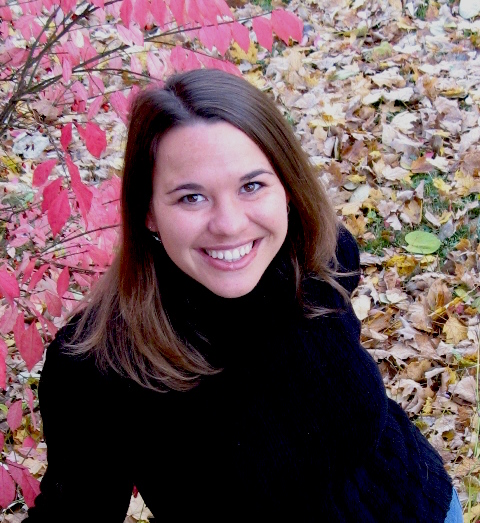
Tonia Schwartz, assistant professor in the Department of Biological Sciences, published a paper titled “Here and there, but not everywhere: repeated loss of uncoupling protein 1 in amniotes,” in the scientific journal, Biology Letters.
In the paper, Schwartz and co-author, Suzanne McGaugh, assistant professor in the College of Biological Sciences at the University of Minnesota, explore the occurrence of body heat in animals.
Schwartz explained that unlike most animals, mammals and birds generate body heat. Uncoupling protein 1, or UCP1, contributes to heat production in mammals, but not birds, which are missing the UCP1 gene.
In the paper, Schwartz and McGaugh demonstrate that the UCP1 gene is missing from all reptiles. Furthermore, as UCP1 is present in fish, the authors conclude that the gene was lost early in the evolution of the reptile-bird lineage.
Despite the role of UCP1 in mammal heat production, Schwartz and McGaugh also confirm previous reports that a functional UCP1 was lost in pigs, and present evidence that a functional UCP1 is missing in dolphin, orca, armadillo and, likely, sloth and hyrax.
The journal Biology Letters is a Royal Society Publication. Click here to read the paper.
|
|
Department of Geosciences receives gift from Vulcan Materials Company
The Department of Geosciences received a $5,000 gift from Vulcan Materials Company in Birmingham to fund the company’s annual scholarship.
The scholarship, which started in 2008, is given annually to a student in the College of Sciences and Mathematics who is enrolled in a geology or geography curriculum. Vulcan Materials Company is the nation’s largest producer of construction aggregates and is a major producer of aggregates-based construction materials including asphalt and ready-mixed concrete.
L to R: Tammy Hartwell, director of development in the College of Sciences and Mathematics; Joe Howle, manager of environmental services at Vulcan Materials Company; and Mark Steltenpohl, chair of the Department of Geosciences.
|
Upcoming Events:
COSAM Today is a bi-monthly newsletter provided by the College of Sciences and Mathematics Office of Communications and Marketing.
We want to hear from you! Do you have news to share? Let us know by filling out this form. If you have questions, send an email to ceh0012@auburn.edu.
For more news about COSAM, visit the website at www.auburn.edu/cosam.
To unsubscribe from this newsletter, send an email to cosam@auburn.edu.
|






